If you want reliable power for your vehicle in 2024, consider the top five car batteries. First, the ACDelco Gold 48AGM offers impressive performance and a three-year warranty. Next, the Weize Platinum AGM Battery guarantees durability and quick starts thanks to its 680A CCA rating. The ACDelco Gold 94RAGM is another excellent option, similar in features to the 48AGM. The Optima RedTop series, including models 8020-164 and 8025-160, provides outstanding starting power and vibration resistance. These batteries are designed to meet diverse needs, allowing you to choose the best fit for your vehicle. More insights await you!
ACDelco Gold 48AGM (88864541) 36 Month Warranty AGM BCI Group 48 Battery
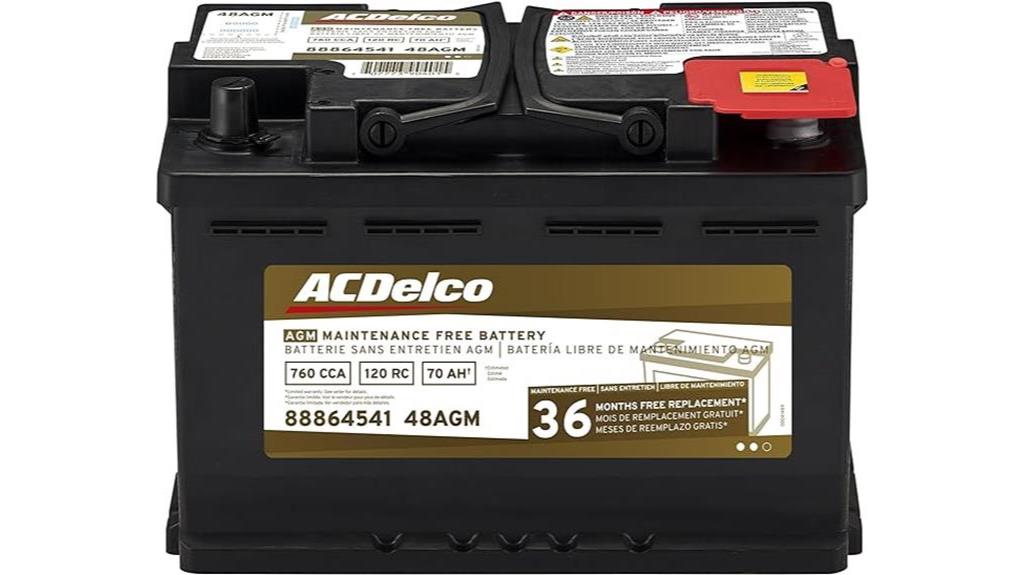
If you're looking for a reliable battery that can handle the demands of modern vehicles, the ACDelco Gold 48AGM (88864541) is a standout choice. This AGM BCI Group 48 battery comes with a solid 36-month warranty, ensuring peace of mind. Its high-density negative paste and silver calcium stamped alloy enhance performance and extend battery life. I appreciate how the robust envelope separator promotes acid circulation and prevents shorts, keeping the battery cool. Plus, it's 100% leak and spill-proof thanks to its Absorbed Glass Mat design. With excellent cycling capabilities, it's perfect for 'start/stop' vehicles and performs well even under heavy loads. Customer reviews speak highly of its reliability, especially in extreme conditions, making it a top contender for 2024.
Best For: Drivers seeking a reliable and high-performance battery suitable for modern vehicles, especially those with 'start/stop' technology.
Pros:
- Durable design with robust envelope separator and leak-proof construction ensures longevity and safety.
- High cycling capabilities make it ideal for heavy-duty applications and extreme conditions.
- Maintenance-free operation thanks to oxygen recombination technology, reducing water loss over time.
Cons:
- Some customers have reported difficulties with warranty claims, leading to potential frustration.
- Weight of 45.5 pounds may be challenging for some users during installation.
- Price may be higher compared to conventional batteries, potentially limiting budget options.
Weize Platinum AGM Battery BCI Group 47-12v 60ah
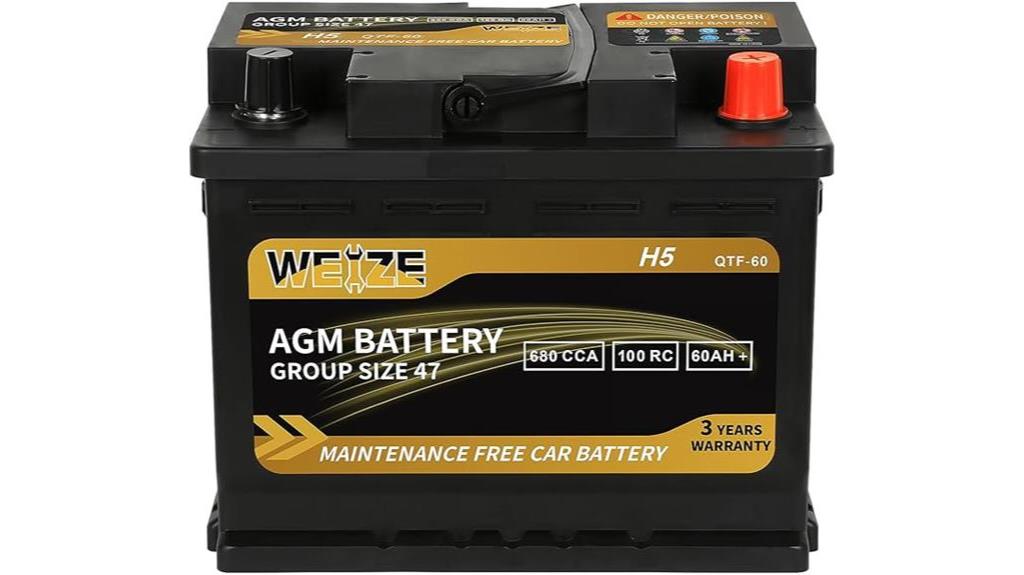
The Weize Platinum AGM Battery BCI Group 47-12v 60ah stands out as an excellent choice for drivers who demand reliable power and performance, especially in extreme conditions. With a robust capacity of 60 Ah and a cold cranking amps (CCA) rating of 680A, it guarantees quick starts even in freezing temperatures. Its AGM technology enhances durability, making it ideal for vehicles with start-stop systems and high-power accessories. Plus, the maintenance-free design means I don't have to worry about leaks. Weize's 3-year warranty adds peace of mind, and I've found it to be competitively priced compared to major brands. Overall, this battery provides exceptional value and reliability, making it a top contender for my automotive needs.
Best For: Drivers seeking a reliable and high-performance battery for vehicles with start-stop technology and high-power accessories, particularly in extreme weather conditions.
Pros:
- Superior AGM technology provides longer lifespan and better vibration resistance.
- Maintenance-free design eliminates concerns about leaks and spills.
- 3-year warranty offers peace of mind for consumers regarding reliability.
Cons:
- Some users have reported minor installation issues, such as discrepancies in terminal sizes.
- Self-discharge rate could be a concern for long-term storage beyond 90 days.
- Charging current and voltage specifications may require careful attention during installation.
ACDelco Gold 94RAGM (88864542) 36 Month Warranty AGM BCI Group 94R Battery
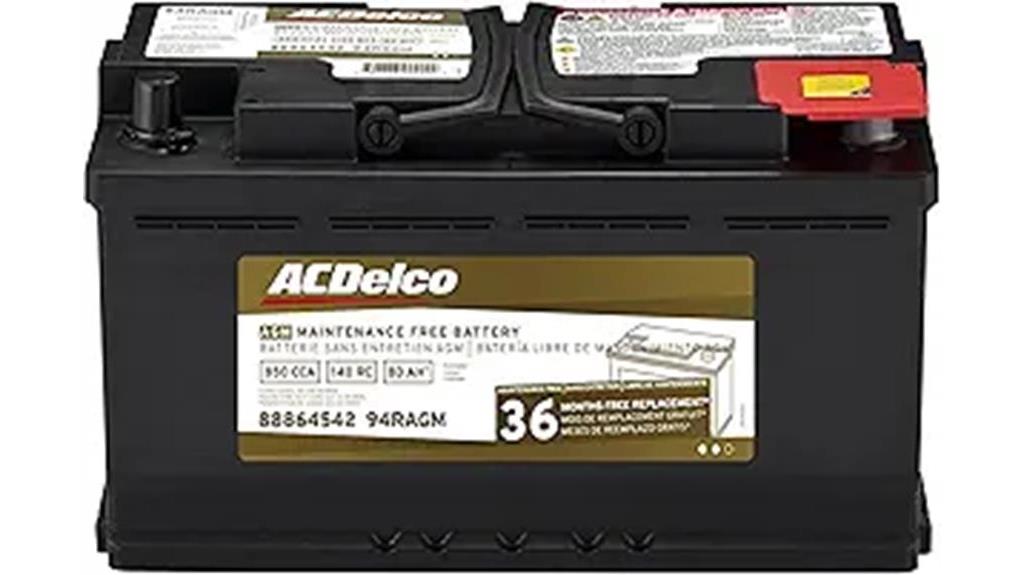
Looking for a reliable battery that can handle the demands of modern vehicles? The ACDelco Gold 94RAGM (88864542) is a fantastic choice with its 36-month warranty and robust performance. This AGM battery features high-density negative paste and a silver-calcium alloy, enhancing cycle life and conductivity. Its design prevents leaks and acid buildup, thanks to a vent cap that resists leakage and an Absorbed Glass Mat construction. Weighing about 53 lbs, it's built for high cycling capabilities, making it ideal for start/stop vehicles. While some users reported delivery issues, its performance and value often shine through. Just remember to check the charge regularly and handle it carefully due to the Proposition 65 warning regarding lead.
Best For: Individuals seeking a reliable AGM battery for modern vehicles, particularly those with start/stop technology.
Pros:
- High performance with enhanced cycle life due to advanced materials like silver-calcium alloy and high-density negative paste.
- Leak-proof design using Absorbed Glass Mat technology ensures maintenance-free operation.
- 36-month warranty provides peace of mind and assurance of product reliability.
Cons:
- Delivery issues reported, with some batteries arriving damaged or upside down.
- Missing components such as vent plugs have been noted in some instances.
- Heavy weight (approximately 53 lbs) may make handling and installation more challenging.
Optima Batteries 8020-164 35 RedTop Starting Battery
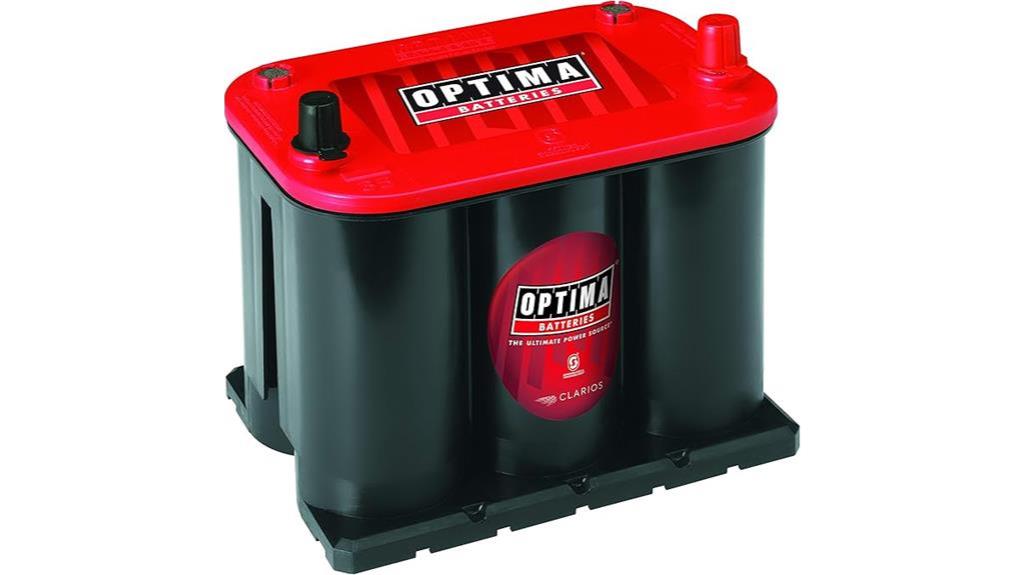
For those seeking a reliable and long-lasting battery solution for their vehicle, the Optima Batteries 8020-164 35 RedTop Starting Battery stands out with its innovative SpiralCell technology. This design offers high power cranking and is both leak-proof and non-spillable, making it versatile for various mounting positions. I've noticed its impressive 15x vibration resistance compared to standard batteries, which really enhances durability. Many users rave about its longevity, with reports of 8-10 years of service. While some customers faced issues with warranty claims, I found the battery's performance and maintenance-free nature appealing. Just keep in mind that it may arrive partially charged, so a pre-installation charge is a good idea for peak performance.
Best For: Those seeking a reliable, maintenance-free battery with exceptional longevity and durability for their vehicles.
Pros:
- High power cranking capability due to innovative SpiralCell technology.
- 15x vibration resistance ensures enhanced durability compared to standard batteries.
- Maintenance-free design allows for convenience and longer shelf-life.
Cons:
- Some customers have experienced failure within the warranty period, leading to dissatisfaction.
- Warranty claims can be frustrating, with mixed experiences reported regarding customer service.
- The battery may arrive partially charged, necessitating pre-installation charging for optimal performance.
Optima Batteries 8025-160 25 RedTop lead_acid_agm Starting Battery
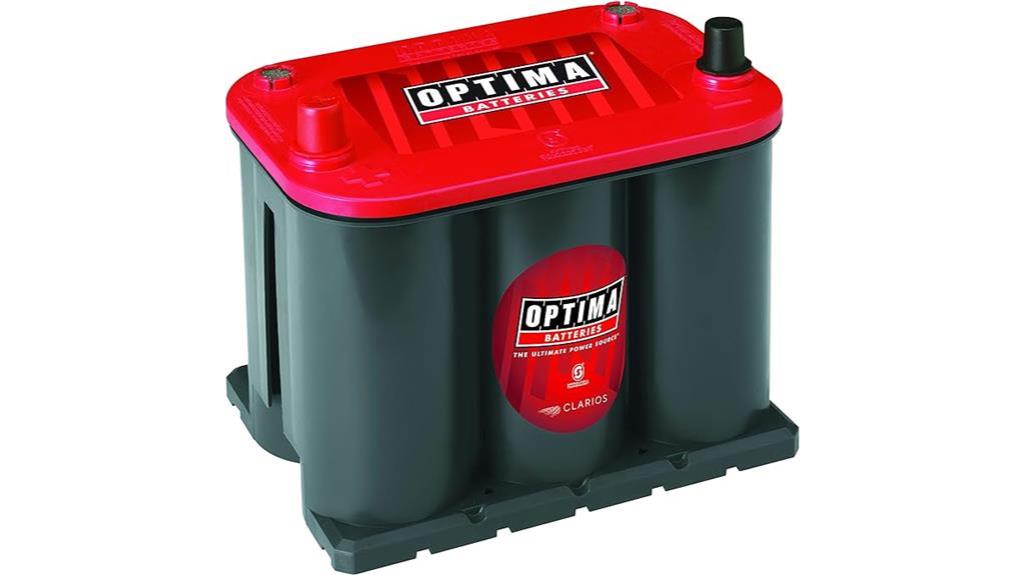
Engineered for peak starting power in harsh weather, the Optima Batteries 8025-160 25 RedTop lead-acid AGM Starting Battery stands out as a reliable choice for those who demand performance in extreme conditions. With a cold cranking amps rating of 720, it delivers exceptional starting power even in frigid temperatures. Weighing 39.5 pounds and designed with a unique SpiralCell technology, it's built for durability and vibration resistance, making it ideal for off-road adventures. This maintenance-free battery also boasts a 90-minute reserve capacity, ensuring you won't be left stranded. However, while many users report impressive longevity, others have faced warranty issues. If you prioritize performance in tough climates, the RedTop could be the battery you need, but be mindful of potential service challenges.
Best For: Those seeking a reliable starting battery for extreme weather conditions and off-road applications.
Pros:
- Maintenance-free design eliminates the need for regular upkeep.
- Exceptional cold cranking amps (720) provide strong starting power in frigid temperatures.
- Vibration resistance ensures durability during rugged use, making it ideal for off-road vehicles.
Cons:
- Warranty claims can be challenging, with mixed customer service experiences reported.
- Some users experienced failures shortly after purchase, raising concerns about reliability.
- Higher cost compared to cheaper alternatives, leading some to question overall value for money.
Factors to Consider When Choosing Car Batteries
When choosing a car battery, you need to take into account several key factors that can impact performance. Think about the battery type, cold cranking amps, and warranty duration, as these can affect your vehicle's reliability. Also, keep dimensions, weight, and maintenance requirements in mind to guarantee you pick the right fit for your needs.
Battery Type Selection
Choosing the right car battery can greatly impact your vehicle's performance and reliability. You'll primarily find two types: lead-acid and lithium-ion. Within lead-acid, you have flooded and Absorbent Glass Mat (AGM) options. If you often drive in extreme temperatures or rough conditions, AGM batteries are worth considering—they offer better performance in those situations and resist vibrations more effectively.
When selecting a battery, think about its lifespan. Traditional lead-acid batteries typically last around 3-5 years, while AGM batteries can last longer due to their maintenance-free design and reduced water loss. If convenience is a priority for you, maintenance-free options like AGM and gel cell batteries will save you from regular upkeep.
Additionally, consider the Reserve Capacity (RC), which indicates how long your battery can power essential components if the alternator fails. A higher RC means better reliability during unexpected situations. By weighing these factors, you can choose a battery type that best suits your driving habits and environmental conditions, ensuring you get the most reliable power for your vehicle.
Cold Cranking Amps
Understanding Cold Cranking Amps (CCA) is vital for guaranteeing your vehicle starts reliably in cold weather. CCA measures a battery's ability to deliver a specific number of amps at 0°F (-18°C) for 30 seconds while maintaining at least 7.2 volts. If you live in a region with harsh winters, a higher CCA rating is essential for dependable engine starts.
When selecting a battery, check that its CCA rating meets or exceeds your vehicle manufacturer's recommendation. Batteries with lower CCA ratings might struggle in cold conditions, leading to frustrating starting failures or longer cranking times. To enhance performance, particularly in extreme weather, it's wise to choose a battery with a CCA rating at least 20% higher than the minimum requirement.
This extra cushion guarantees that your battery can handle unexpected cold snaps without leaving you stranded. Remember, investing in a battery with a strong CCA rating can save you time, hassle, and money in the long run, especially when winter hits. So, when you're shopping for a new car battery, keep CCA at the forefront of your decision-making process to guarantee reliable power when you need it most.
Warranty Duration Importance
Battery warranties can make or break your decision when selecting a new car battery. A longer warranty duration often reflects the manufacturer's confidence in the battery's longevity and performance. Most warranties range from 3 months to 36 months or more, so it's wise to choose one that offers peace of mind, guaranteeing you won't face unexpected failures during everyday use.
Extended warranties typically cover defects and performance issues, allowing you to seek replacements without incurring extra costs. However, warranty claims can be complicated, and terms may vary by retailer. It's essential to understand these terms before making a purchase, including any requirements for proper installation and maintenance.
Since the average lifespan of car batteries ranges from 3 to 5 years, a warranty that aligns closely with this duration can be particularly valuable. It not only guarantees product reliability but also minimizes unexpected expenses. By carefully considering warranty duration, you're making a smarter choice that can save you hassle and money down the line. So, when you shop for a car battery, don't overlook the importance of a solid warranty—it could be your best safeguard against future issues.
Dimensions and Weight
When it comes to selecting a car battery, dimensions and weight play a pivotal role in guaranteeing compatibility and performance. Car battery sizes can vary considerably between models, typically ranging from about 6.89 x 9.52 x 7.48 inches to 10 5/16 x 6 13/16 x 7 5/8 inches. It's crucial to match the battery dimensions with the specifications in your vehicle's manual to avoid installation issues.
Weight is another critical factor, as car batteries usually weigh between 39.5 pounds and 53 pounds. A heavier battery might offer more power, but it can also affect your vehicle's handling and fuel efficiency if your car isn't designed to accommodate it.
Make sure the battery fits securely in the mounting space, maintaining proper weight distribution. This guarantees not only compatibility but also peak performance. Choosing the right dimensions and weight will help you avoid complications and maintain your vehicle's overall efficiency. So, before making a purchase, double-check both the size and weight to confirm you're getting the best battery for your specific needs.
Maintenance Requirements
Maintaining your car battery is vital for guaranteeing its longevity and performance. When choosing a battery, consider whether you prefer maintenance-free options, like AGM types, which don't require regular water checks or electrolyte maintenance. This convenience can save you time and effort.
Even with maintenance-free batteries, it's important to regularly check the battery terminals for corrosion. A simple cleaning with a terminal brush can prolong battery life and guarantee peak performance. Additionally, make certain your alternator is functioning correctly; this prevents battery deterioration and helps maintain charge levels.
Extreme heat can negatively impact your battery's lifespan, so be mindful of using unnecessary electrical accessories during hot months. If you opt for a battery designed for high cycling capabilities, keep an eye on the voltage and replace it if it drops below 12 volts. This proactive approach can prevent unexpected failures and keep your vehicle running smoothly.
Frequently Asked Questions
How Do I Properly Maintain My Car Battery?
Think of your car battery as the heart of your vehicle. To keep it pumping strong, you need to maintain it regularly. Check the terminals for corrosion and clean them if needed. Make certain it's securely mounted and free from vibrations. Keep an eye on the water level in non-sealed batteries, topping it off when necessary. Finally, test your battery's charge periodically to avoid surprises on the road. Your ride will thank you!
What Are the Signs of a Failing Car Battery?
If your car battery's failing, you might notice several signs. First, you may struggle to start your vehicle, hearing clicking sounds instead of the engine turning over. Also, dimming headlights or electrical issues indicate weak power. If the battery's casing bulges or there's corrosion around the terminals, it's time for a check-up. Keep an eye on warning lights on your dashboard, as they can signal battery problems before it's too late.
Can I Install a Car Battery Myself?
Yes, you can install a car battery yourself! It's a straightforward process if you have the right tools and follow safety precautions. Start by gathering your materials: a new battery, wrenches, and safety gloves. Disconnect the old battery, noting the terminal connections, then remove it. Place the new battery in the same position, connect the terminals securely, and double-check your work. Just remember to dispose of the old battery properly!
How Long Does a Typical Car Battery Last?
So you thought car batteries were like fine wine, getting better with age? Unfortunately, they typically last about 3 to 5 years, depending on factors like usage and climate. If you live in a place where it's always hot or cold, you might find yours needing a replacement sooner. Keep an eye on the signs, like dimming headlights or slow starts, so you don't get stranded like a deer in headlights!
What Is the Difference Between AGM and Lead-Acid Batteries?
AGM (Absorbent Glass Mat) batteries and lead-acid batteries differ mainly in construction and performance. AGM batteries have a sealed design, making them more resistant to vibration and leakage. They also charge faster and can handle deeper discharges compared to traditional lead-acid batteries. While lead-acid batteries are generally cheaper, AGM batteries offer longer life cycles and require less maintenance. If you prioritize performance and reliability, AGM might be the better choice for your needs.
Wrapping Up
In the wild world of car batteries, choosing the right one can feel like finding a needle in a haystack—while blindfolded! But fear not! With our top picks, you'll release a power-packed beast under your hood, leaving your neighbors in awe as your car roars to life like a lion. So, whether you need reliability for the daily grind or power for epic road trips, these batteries have got your back. Buckle up for an electrifying ride!
